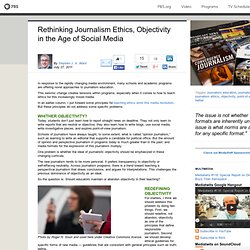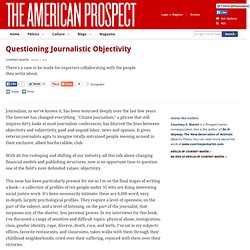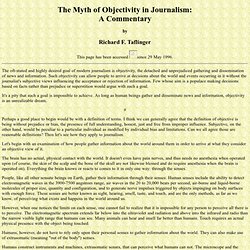

Emily
SPJ Code of Ethics. SPJ Code of Ethics Revised September 6, 2014 at 4:49 p.m.

CT at SPJ’s National Convention in Nashville, Tenn. Download a printable copy [PDF]:8.5x11 flyer | 11x17 poster | Two-sided bookmark Preamble. Journalistic Ethics, Objectivity, Existential Journalism, Standpoint Epistemology, and Public Journalism - Journal of Mass Media Ethics - Volume 16. Objectivity in Journalism: A Search and a Reassessment. What is journalism? In Defence of a Supposedly Outdated Notion: The Range of Application of Journalistic Objectivity. Gilles Gauthier (Université Laval) If thought is to go far enough, the imagination must go further.

If the will is to accomplish enough, it must imagine more. Gaston Bachelard, La formation de l'esprit scientifique Among all the clichés that clutter up human minds, there is one which gives rise to a stir of approval in its audience each time it is sententiously pronounced: "Objectivity does not exist--in reporting. " In politics, labour unions, diplomacy, business, culture, and justice its existence is not questioned. Few journalists or journalism scholars today would hazard calling upon the principle or ideal of objectivity. In the present paper, I confront the cliché that objectivity in journalism is useless, illusory, or artificial.
Just the Facts: How "Objectivity ... - David T. Z. Mindich. The objectivity norm in American journalism* Why did the occupational norm of ‘objectivity’ arise in American journalism?

This question has attracted the interest of many journalism historians but it has not previously been examined as an instance of a more general social phenomenon, the emergence of new cultural norms and ideals. Four conditions for the emergence of new norms are identified – two having to do with the self-conscious pursuit of internal group solidarity; and two having to do with the need to articulate the ideals of social practice in a group in order to exercise control over subordinates and to pass on group culture to the next generation.
The objectivity norm in American journalism* Principles of Journalism. The first three years of the Project’s work involved listening and talking with journalists and others around the country about what defines the work.

What emerged out of those conversations are the following nine core principles of journalism: 1. Journalism’s first obligation is to the truth Democracy depends on citizens having reliable, accurate facts put in a meaningful context. Journalism does not pursue truth in an absolute or philosophical sense, but it can–and must–pursue it in a practical sense. 2. While news organizations answer to many constituencies, including advertisers and shareholders, the journalists in those organizations must maintain allegiance to citizens and the larger public interest above any other if they are to provide the news without fear or favor. 3. Journalists rely on a professional discipline for verifying information. 4. Rethinking Journalism Ethics, Objectivity in the Age of Social Media. In response to the rapidly changing media environment, many schools and academic programs are offering novel approaches to journalism education.

This seismic change creates tensions within programs, especially when it comes to how to teach ethics for this increasingly mixed media. In an earlier column, I put forward some principles for teaching ethics amid this media revolution. But these principles do not address some specific problems. Whither objectivity? Today, students don’t just learn how to report straight news on deadline. Schools of journalism have always taught, to some extent, what is called “opinion journalism,” such as learning to write an editorial that supports a candidate for political office.
One problem is whether the ideal of journalistic objectivity should be emphasized in these changing curricula. The new journalism tends to be more personal. So the question is: Should educators maintain or abandon objectivity in their teaching? Questioning Journalistic Objectivity. Journalism, as we've known it, has been mourned deeply over the last few years.

The Internet has changed everything. "Citizen journalism," a phrase that still inspires dirty looks at most journalism conferences, has blurred the lines between objectivity and subjectivity, paid and unpaid labor, news and opinion. It gives veteran journalists agita to imagine totally untrained people messing around in their exclusive, albeit hardscrabble, club. With all this reshaping and shifting of our industry, all this talk about changing financial models and publishing structures, now is an opportune time to question one of the field's most defended values: objectivity.
This issue has been particularly present for me as I'm on the final stages of writing a book -- a collection of profiles of ten people under 35 who are doing interesting social justice work. And I told them that I would show them drafts and give them a chance to give me feedback and correct inaccuracies before the pieces become public. The Myth of Objectivity in Journalism. By This page has been accessed since 29 May 1996.

The oft-stated and highly desired goal of modern journalism is objectivity, the detached and unprejudiced gathering and dissemination of news and information. Such objectivity can allow people to arrive at decisions about the world and events occurring in it without the journalist's subjective views influencing the acceptance or rejection of information. Few whose aim is a populace making decisions based on facts rather than prejudice or superstition would argue with such a goal. It's a pity that such a goal is impossible to achieve. Public Journalism and the Problem of Objectivity.
Help.